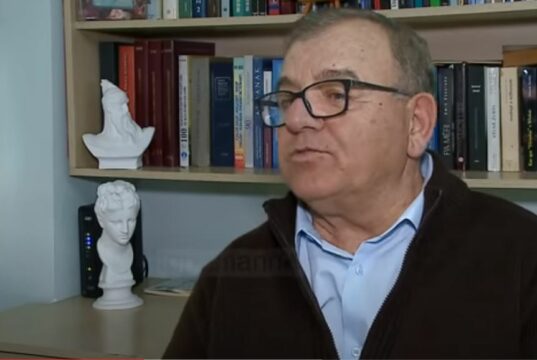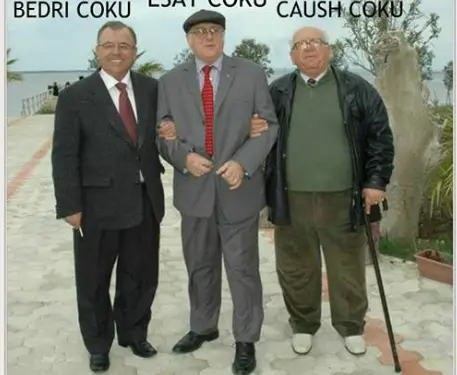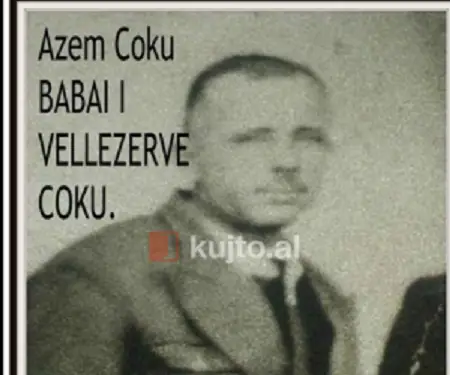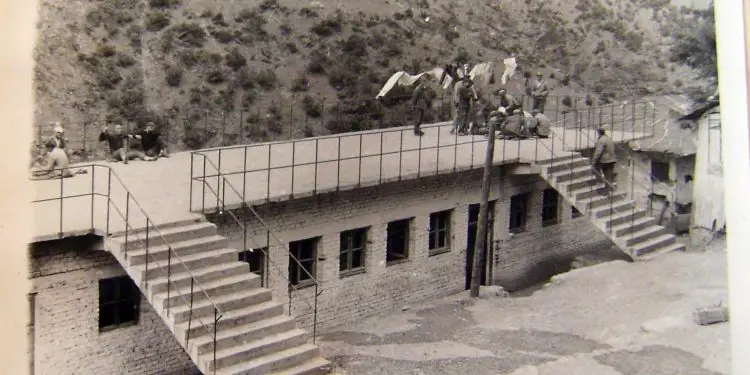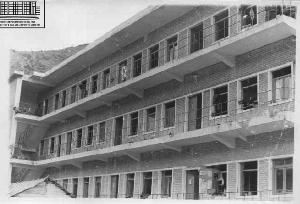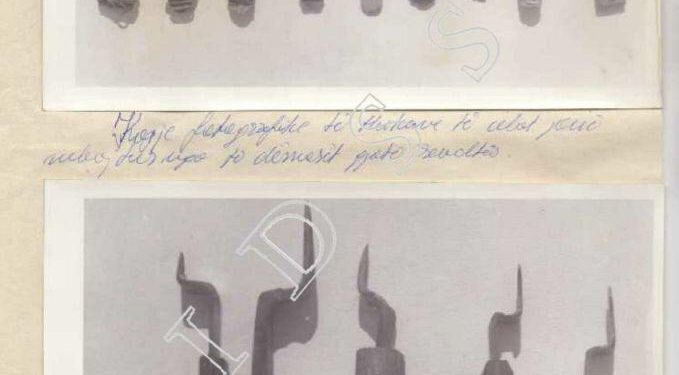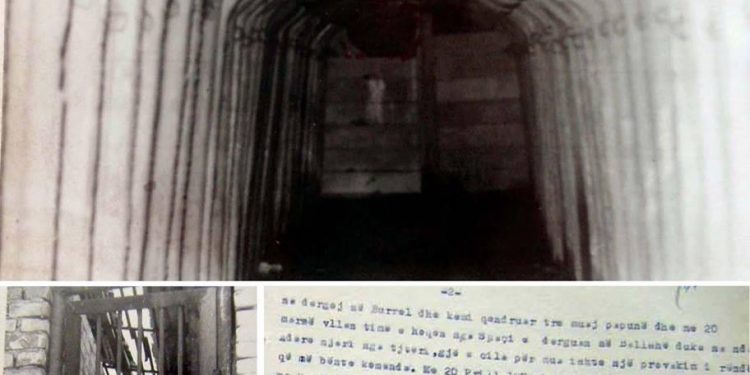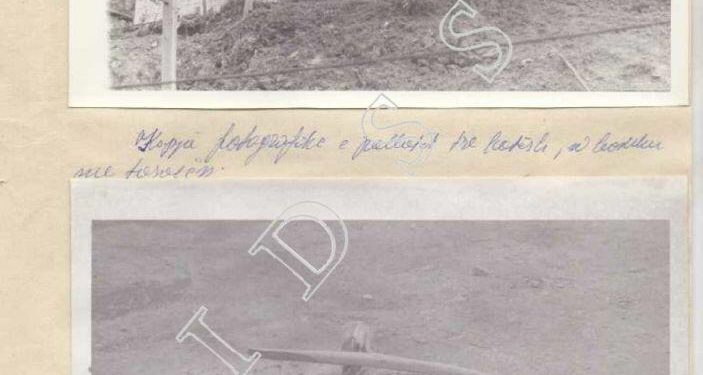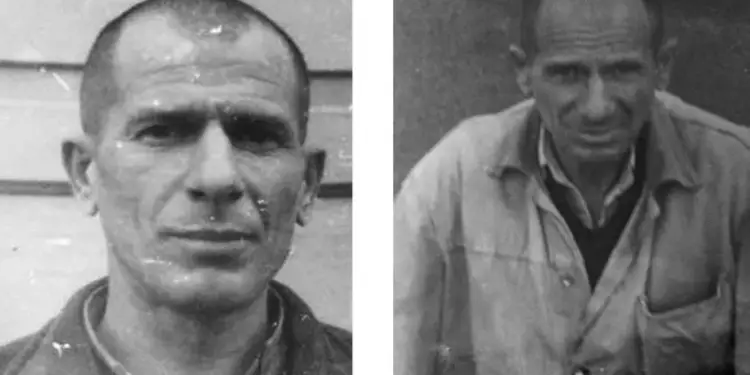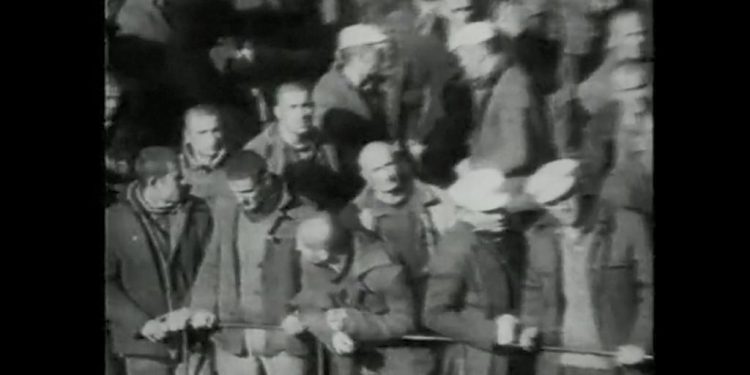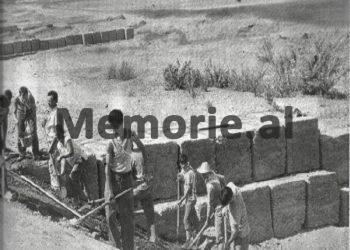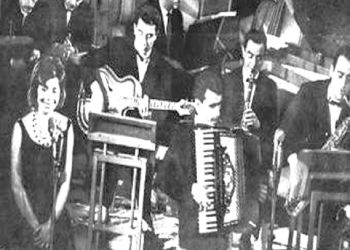By Bedri Çoku
The fifth part
Memorie.al publishes the unknown testimonies of Bedri Çoku, originally from the village of Muçias in the district of Lushnja, who at the age of 19, while performing compulsory military service in the district of Gjirokastra, was arrested by two senior State Security officers and after a “unmasking” public trial with accusations mounted in the cinema of that city, he was convicted for agitation and propaganda together with his brother, Çaushi, for the only “guilt” that their father had suffered several years as a prisoner in the forced labor camps from where he was released in 1959. Rare testimonies of Bedri Çoku who spent 24 years in the prisons of Spaç, Burrel and Qafë Barit and together with his two brothers, Esat and Çaushi and their father, Azemi, suffered 64 years in prison in the camps and prisons of the communist regime of Enver Hoxha, being released only in February 1991. Memories of Bedri Çoku masterfully described in his book “The uprising that shook the dictatorship”, which where is mainly added to the Spaç Revolt in May 1973, where he as one of its main organizers, sheds light for the first time by making public some unknown events and facts from that revolt where the flag was raised without the red star of communism, and until his work as General Director of Camps and Prisons after the ’90s, where he “arrested” his close friend, the accomplice of the dictatorship camps and prisons and sent him to the cells of’ Prison 313 ‘. Tirana, where most of the former Political Bureau of the Central Committee of the ALP headed by Ramiz Alia and Nexhmije Hoxha were serving their sentences.
The uprising that shook the dictatorship
(Based on a true story)
“To raise the flag, without the communist star, I expressed the opinion that, unable to find a red sheet, we would break our hands and, with our blood, paint the white cloth…! The first to cut his hand with a knife was my brother, Çaushi, the second Gëzim Medolli, Bedri Çoku, Gjet Kadeli, Ulsi Pashollari, and others…”
We very much hoped for European Security and Cooperation which was being carried out at a dizzying speed under the special care of the United States of America. Rightly all mankind was eagerly awaiting the great historical moment. Signing for the Understanding of the Peoples of Europe, Western Democratic States and Eastern Communist States, which were still suffering from dictatorial regimes, to bring together a new order of peace and cooperation in the world. We hoped that Albania on this occasion as well. She would sign in Helsinki this Act for the Fates of Humanity, as a representative of this International Political Organization. We were convinced that our country, though incomparable to the countries of the East, would, by grace or by accident, join the Treaty of Peace and Cooperation with Europe (OSCE).
Author
Continued from the previous issue
REBELLION
Immediately after this threat, the gate from where the three of us had entered, in front of the state representative, opened with a bang and a boy from Mallakastra appeared, Hajri Pashai, half naked, with a sky beret on his head, who directed them Ficori’s finger, telling him he was a big, cheeky cheater.
– “Forget it, your lord” – Hajriu spoke angrily, – ‘when the Germans arrested you for the nonsense you do with the guerrilla units of the partisans and imprisoned you for only three hours, with chocolates and biscuits they kept you because you were young, uncle. Whereas I, Hajri Pashaj, was 18 years old when you arrested me, because I expressed the desire to live in another country, where life is better. Without killing anyone, without stealing, without cheating, without raping…! I am turning thirty and I still have to suffer many years in prison because you severely punished me. I am hopeless that one day I will be freed from this hell that you, the Albanian communists, created for your compatriots, which the history of mankind has not known. Out of all human logic, you also removed the apology for your political opponents, which you did until 1962 … You are so soulless…”?!
– “Who are you”? asked Fiçori.
– “Zenel Brahushi is called my father, from your village, a fellow villager with you … However, now in the world you are left only with the cinematographers, continued Hajriu … Neither friends nor comrades. But you are also breaking up with them, because China planted the “Tree of Friendship” with America. The day has come for the criminals of Tirana to come here, where we are. To work in the mine and eat the dirty food we are eating and drink this stinking water with acid…”! Insulted and angry, Fiçori interrupted:
“Oh, why don’t you say you are the son of the father, the tyrant of the village elders.” With these thoughts of your father, because you have to waste the bones here, in the Spaç mine…”?! Hajri removed the beret from his head and, excited that he had managed to say what he wanted to his fellow villager in power, passed the beret in front of his stomach, down to the saddles, and with a gesture of pride, said:
– “To shave me…., You and your friends from Tirana, you got a dog and a dog son”!
Ficori, fleeing furiously, shouted: – “You will pay with your head what you said, you took a sworn enemy of popular power”! Immediately after this hostile debate with the government representative came the ultimatum through the megaphone, from the state police chief, who set the deadline for surrender until the next morning. Otherwise, state intervention would be ruthless…!
The ultimatum was repeated every half hour with a megaphone, while we responded with war cries: – “Dead yes, Flag, no”! “Here is death, here is freedom”! “Down with Communism”! “Long live European Security and Cooperation”!
“Long live free and democratic Albania”! This psychological warfare continued until late at night. At dawn on the third day, without eating or drinking, exhausted, with some of my friends, aware of what we had done and would do, we decided to take a nap a few times, just enough to gather strength for the day. cloud that was coming. I can’t say how long I had been napping, but wandering in my sleep, it was as if someone was calling me: “Bedri…., Bedriiii…, ariseeee…, ariseeee…”!
Only when I was shaken violently did I open my eyes distracted. Around the bed were my friends from the faith, Sadedin Taipi from Shkodra, Mihal Shteto, from Narta, Luigj Uci from Shkodra, Feti Kumanaku from Roskovec, etc. Sadedin Tahipi was the one who said, crying with tears in his eyes: “The flag … The flag … they lowered it … they lowered it … they lowered it …”!
I jumped up. I asked if they knew who had committed this betrayal. They shrugged. I took out the knife and said: – “Then, let’s go and punish the traitor”! I remember that Bashkim Fishta, a boy from Tirana, came and told us that the flag was lowered by the owner of the red meringue, Rexhep Lazëri, and he burned it. That’s it. We searched and found Rexhepi. He saw us and approached us with open arms.
– “Do not worry, he said, I hid the Flag, so that criminals would not take it…”! I restrained myself.
“If it weren’t for the cover of your quilt,” I said, “you would have a knife in your throat now…”!
– However, the shame will remain on you, for what you have done! said Luke, a newcomer.
Then he addressed us. He was older than all of us. – Anyway, the flag did its thing, guys. It gave us the strength to terrify criminals. No matter what happens, we are proud of what we have done these three days. We have not surrendered and will not surrender, even without our flag of Uprising. Shame and responsibility for our fate in these conditions, as much as we could do, let it remain the greats of the world, who let the Albanian criminals vegetate in the middle of Europe. And he pushed Rexhep Lazër, his friend and ours, with both hands on his chest.
He played the guitar and sang while his friends and other accomplices clashed with the sambists istët ?! Taking advantage of the lowering of the National Flag, without the communist star, army and police forces rushed in furiously inside the camp. It was still before sunrise, illuminating, first, the face of Munella Mountain. Nearly half of the prisoners were napping from exhaustion. But only a handful of invincible youths and men bravely clashed with the military and police. Undoubtedly the victory this time would be on the side of the camp sieges, to the point of exhaustion, but, but, this epic among the unequal, was valid for the insurgents as they were sealing the traces of a great cause, for freedom and democracy…!
The hand-to-hand fight became more bloody and painful than other times. The revenge of the state forces was powerful, inhuman and unbearable. Not only those who resisted were struck mercilessly, but also people who slept or lay down from the diseases of deep old age. Without question, the sambo fighters bravely fought the unforgettable, those who were shot that day in an improvised trial, with members of the Supreme Court, under the command of Deputy Minister Fiçor Shehu and the support of Police Director Kasem Kaçi. These four young heroes of the nation: Dervish Bacon, Pal Zefin,
Hajri Pashaj and Skender Daja were dragged out on stretchers, or dragged through the cobblestones of the road to the Command offices. There were rumors from the prisoners that they were taken to the command offices, almost dead…!
Skender Daja, Dervish Bejko, Pal Zefi, Hajëri Pashaj, the case of Skender Daja, this time, was unimaginable. Before the camp was attacked by state forces, he had climbed onto the bathroom terrace, where prisoners usually appealed, played the guitar and sang Italian songs. He was beaten to death because he continued to sing even when his comrades clashed with the regime’s furious sambo wrestlers. Skënder Daja in particular, had a beautiful voice and sang constantly for his friends with the guitar of Vaçe Zela, which she had brought to his memory, Gëzim Çela, through his mother, in Lushnja, the neighbor with the legendary singer of the Albanian nation. “Little” Skender was the brother of Engjëllushe Daja, who shone with her brilliant voice, alongside Vaçe Zela and other talented singers, in the sixties and seventies. So, he was dragged away by the rabid sambo wrestlers with songs in his mouth.
*****
Many times, I wanted to write about a wonderful being that I knew in my life, in the camp – prison of Spaç, from a young age, they said, that a mysterious hand had put him inside, in the siege of the camp and the prisoners, kept hidden, until she got to her feet and realized their love. He was fed with pleasure by everyone, and there were even cases when the prisoners “quarreled” over who washed and cleaned Tart’s body, and kept him in his bed, or slept on his side, a few times with him. He was so close and loving to the prisoners that no one could stop him from coming out of the siege and climbing the mountain whenever the work brigades left to work in the gallery. Tart at all, Tart (named after the one who found him, whom no one could oppose) insisted, in the rain and in the sun, to go with them. He secretly left the siege to be with the afflicted, even though the workplaces were on the side of the mountain, where the entrances of the deep galleries were located.
He got tired up there, but the prisoners, happily, took him in their arms, like a baby, until he rested. So he did every day. He took prisoners to work and hired others. His soul was not separated from those exhausted people. He was everyone’s child, everyone’s friend, everyone’s little brother. He got angry with the police and gritted his teeth whenever they tortured the prisoners. He stood all the time next to those who were suffering, tied to the “pillar of punishment”, under the scorching sun, or in the frozen snow, as they could not fulfill the norm of work … The cake licked his hands, feet, face the prisoner who was suffering and rested his body on him, to alleviate his body aches as little as possible. He would fight with the police whenever they wanted to take him away from the suffering prisoner, but Tarti also rushed to bite him if they did not retreat. The police had troubled him, but they could not punish him. They knew that, for the wonderful Tart, the prisoners left their heads.
In the clashes between the prisoners and the prison police, during the uprising, Tarti was furious against the police. He attacked them constantly, biting them as much as he could, forward, backward. He even knocked them to the ground and stuck their teeth straight into their necks. The day after the shooting of four heroes and the arrest of numerous prisoners, Tartin was poisoned by the commanders inside the camp. Then the frozen body was taken by the soldiers from the prison camp, and hung on a rope, beyond the siege, under the watch of hundreds of prisoners, who with tears in their eyes prayed for the soul of Tart…!
He was condemned as an enemy of the people, as an ardent supporter of the uprising of political prisoners and, collaborating with “their counter-revolutionary organization, in Spaç prison. He died as a hero, after the communist savagery suppressed the revolt barbarously…! Eh, who among the prisoners did not weep like a child for the macabre death of the precious and majestic Tart!
They comforted each other with tears in their eyes, proudly saying: “May the memory of our five heroes not be forgotten”!
*****
The victors carried out inhumane massacres of prisoners, especially young men and those who continued to oppose, until they were forced to lie down in the camp yard. Then they pulled out one of the commanding officers, with a list in hand, where the horn stood on their faithful servant, the head of the Technical Office, the prisoner Mehdi Noku from Librazhd. He accompanied the command officer, after staying for more than two hours, upstairs, in the command offices, with the Deputy Minister of Interior, the Director of State Police and who knows with whom else, perhaps more important than the first two. The commanding officer, whom I did not see, because my eyes were covered with blood and swelling, read eight other names, besides those taken with stretchers by the policemen and the sambo wrestlers, immediately, as soon as they lost consciousness from the blows of ruthless and took them to command. They were Pal Zefi, who caused the revolt to start and refused to work for the regime without pay; Hajri Pashaj, who severely insulted the Deputy Minister of Interior; Dervish Bejko, as the main one in the clashes with the police and who hurt them, like no one else, Skender Daja, for the famous call of soldiers and civilians who voluntarily watched through the open trenches around the camp.
Others on the list were people I loved and adored for the anti-communism and patriotism inherited from generation to generation: Hodo Sokoli, from Shkodra, the nephew of the famous Hodo Sokoli, who went down in history as a military leader in the war. to defend Ulcinj and the city of Shkodra, in 1878 – 1881, from the Montenegrins; Sami Dangëllia, political prisoner, since the first days of communist rule, who became famous in the world, champion, with 41 years in prison; Luan Koka from Vlora, of commercial and nationalist origin. He was arrested with his aunt’s son, who was sentenced to be shot for diversion against the communist regime, while Luan was sentenced to twenty-five years in prison. Luke, my friend, for the obvious insult he did to the Director of State Police. The others were from those who confronted the sambo forces and the policemen coming from the special wards, causing casualties in their ranks.
These were: Syrja Lame, Jorgo Papa and Dashnor Kazazi. Paulin Vata joined the forefathers as a man who knew more than enough about the secrets of the state and government to eliminate it along with them. The twelve were urgently arrested and sentenced the same day at the command offices, in the presence of the deputy interior minister and several unknown individuals, allegedly sent by the top leadership of the state structure, to provide direct and secure information. The Judicial Council of the Criminal College, coming by helicopter from Tirana, which convicted them, consisted of: Ilmi Telegrafi, a member of the High Court; Ymer Aliko, Nd. Judge of the High Court; Mit’hat Goskova and he Nd. Judge of the infamous High Court. With the assistance of Secretary Ylli Mahmudaj and with the participation of the prosecutor before the High Court, Zaim Miftari.
These devoted servants of the communist criminals demanded the death penalty – the shooting for the twelve. This was according to the first instructions, probably from the deputy minister and others around him, with the excuse that only in this way they could get the situation under control. Their shooting should possibly take place inside the camp, in front of the prisoners…! But the arrival of a lightning order from the highest instance of the party-state, forced the trial panel to re-sentence to death-shooting only four people, even the youngest. And exactly those who had been the soul and power of that uprising were elected: Skënder Daja, Dervish Bejko, Hajëri Pashaj and Pal Zefi.
With the change of order, the four of them, probably dead, were taken to the command offices by the duo of revenge, on the same day, “to be shot”, or buried in a secret place, near the bank of the Fan River… The other eight, all sentenced to 25 years in prison, were sent to the closed prison, for which the famous expression was used: “Burrel, where you enter, you do not leave”! /Memorie.al
Continues in the next issue




